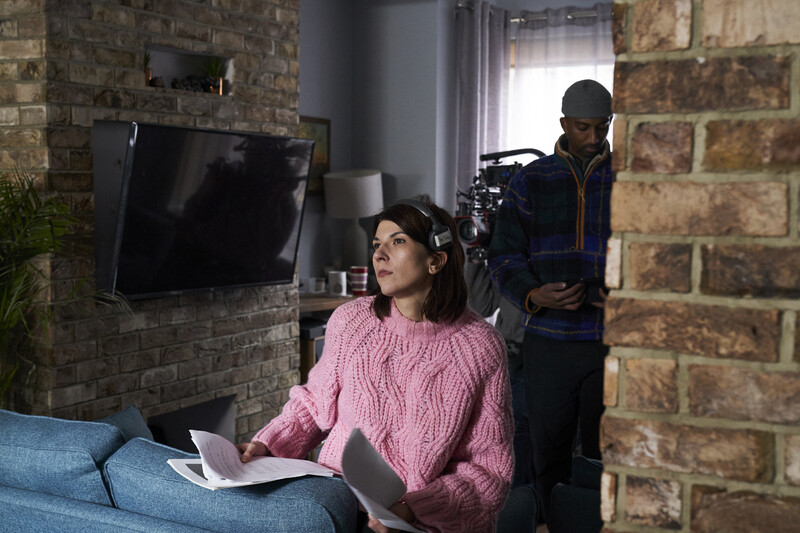Roksana Gotz
Roksana is a Sorbonne University alumna . She did her BA and MA in Theatre Studies and graduated with honors. She wrote her first screenplay in 2016. The short “Two way out” explored the reality of being a struggling artist, while deconstructing the concept of “sacrifices in the name of art”. In 2019, Roksana directed a stage play she co-wrote, which was produced in Sofia, Bulgaria.
Your project has entered our festival. What is your project about?
"Slava" is a short film about a young Ukrainian girl who moved to England with her mother when she was still a child. Living in her comfortable bubble, the notions of "homeland" and "belonging" were just an abstract concept for her. The 24th of February 2022, Slava's familiar reality is shattered into pieces, leaving her to deal with the feeling of survival guilt and the collective pain shared by millions. Slava's disorientating experience of witnessing this tragic event through other people, as well as through the screen of her TV pushes her to rediscover for herself "What means to be Ukrainian?"
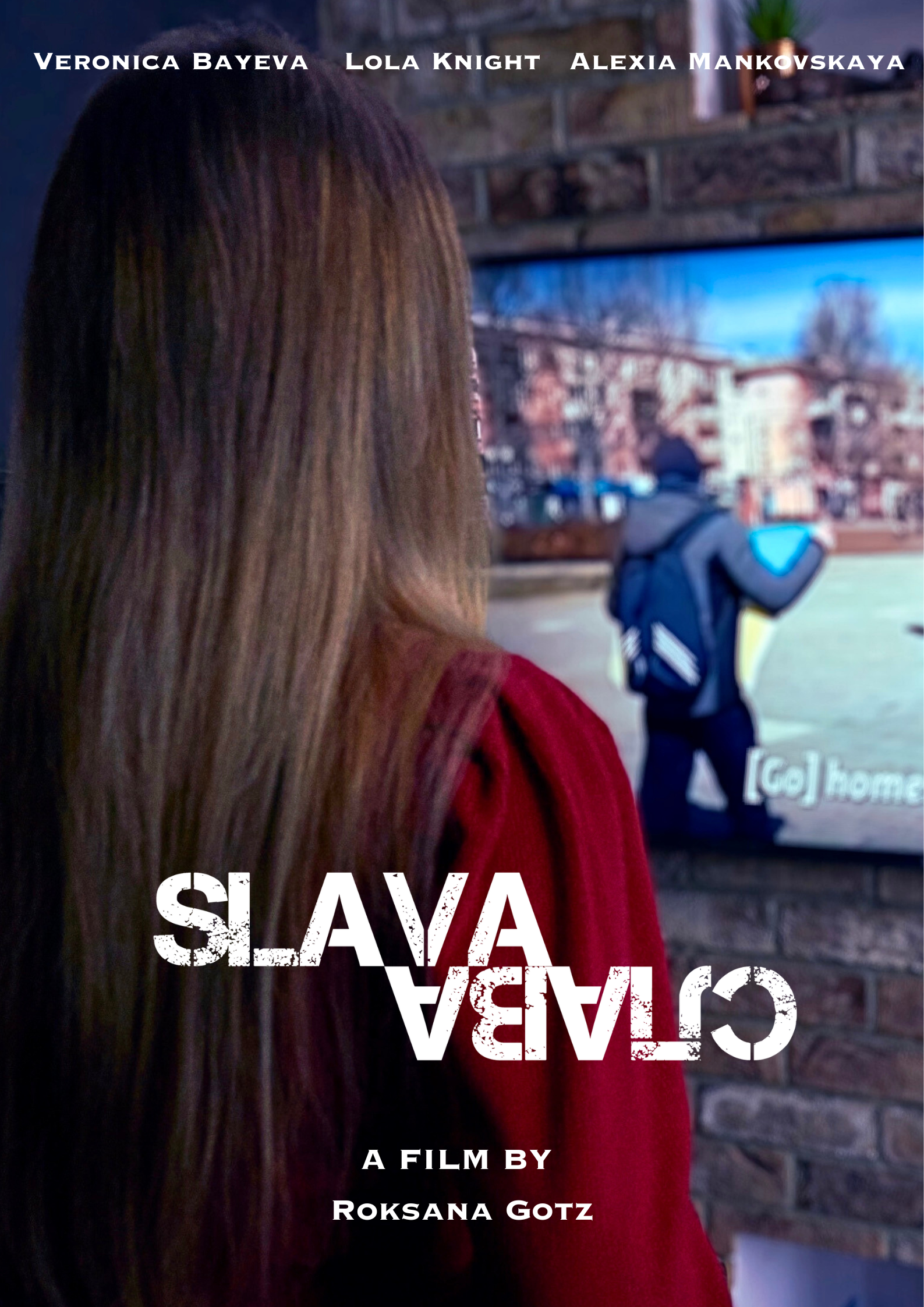
What are your ambitions with your project?
People to see it. Of course I would love more people to watch "Slava", every artist wants their work to be seen. But if someone told me before the shooting that no one ever is going to watch it, I would still have gone ahead and made it, because I just needed to tell this story. I do believe art is in a way a selfish act. And to be honest, I find art, for me, more in the process than in the final result. Like Yves Klein said " My paintings are only the ashes of my art".
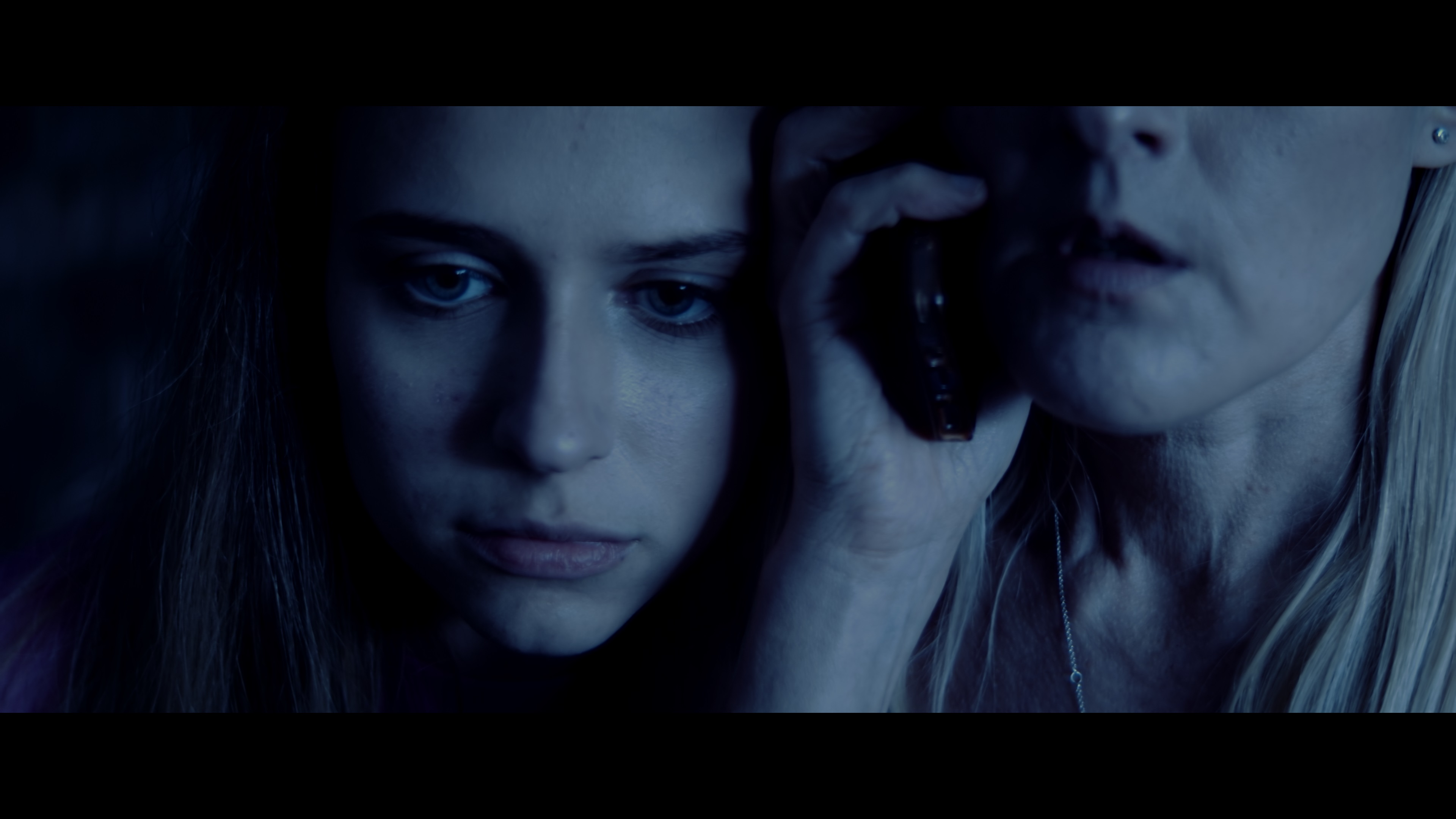
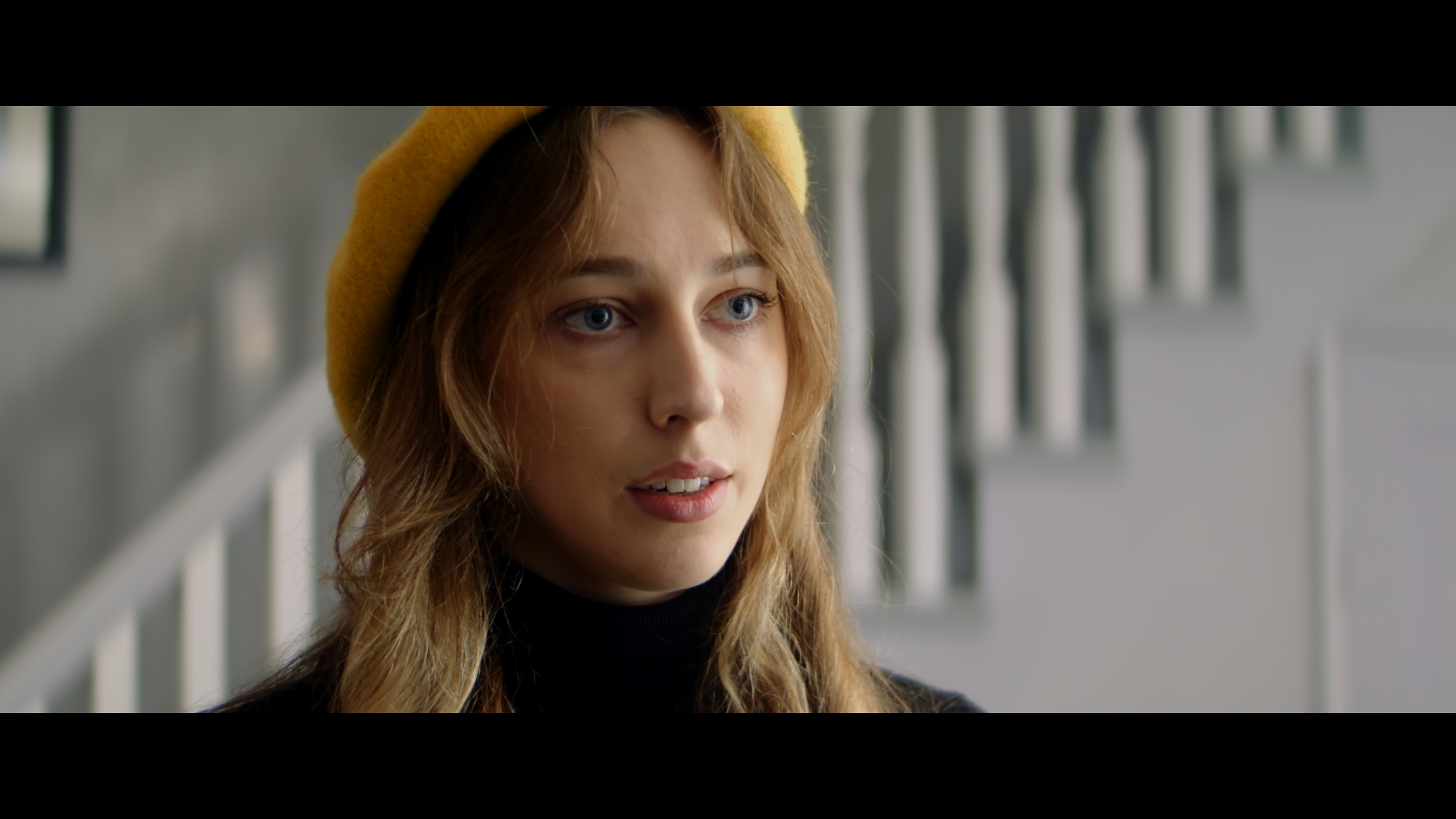
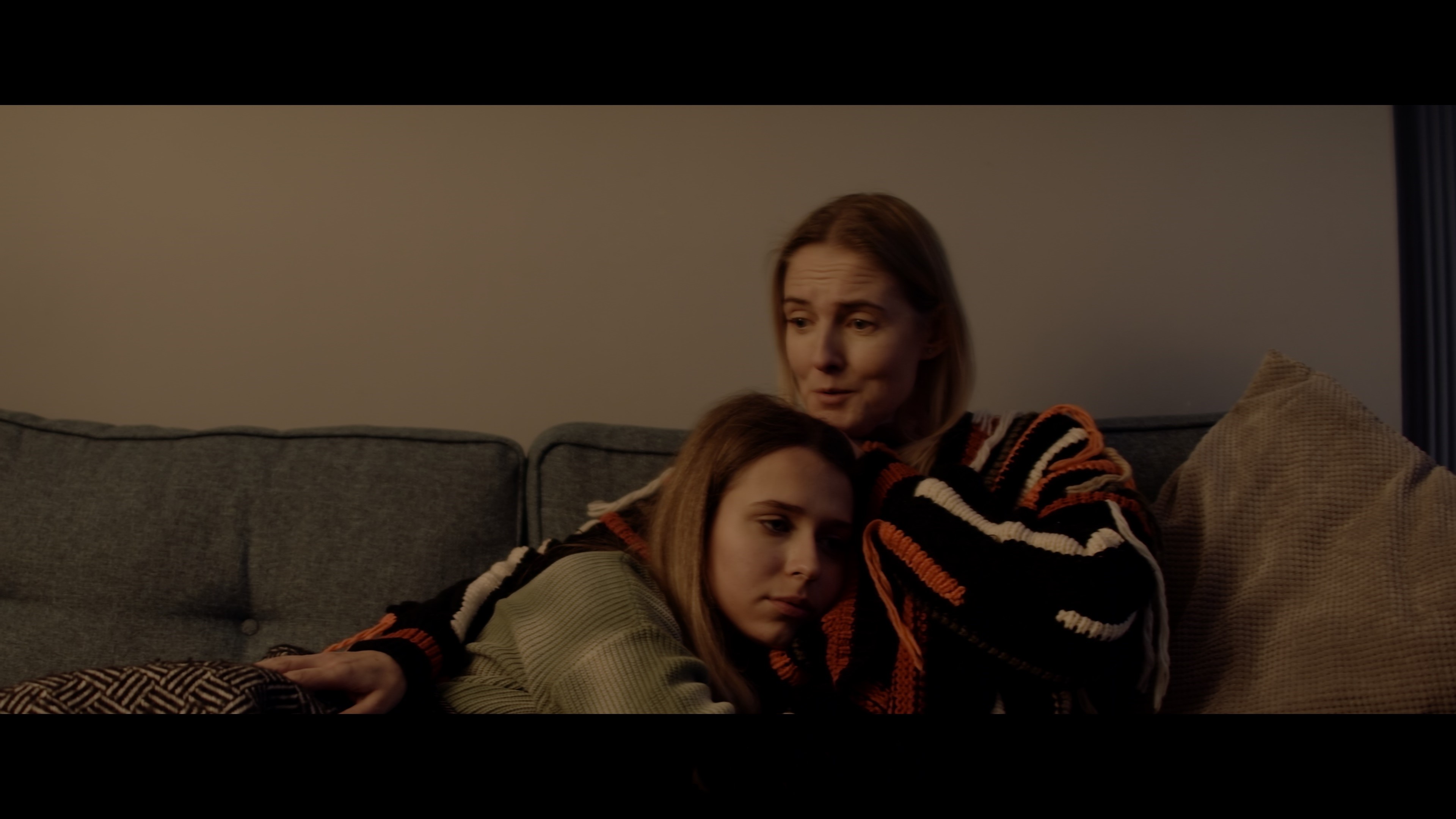
Tell us something about your shooting? What pleasantly surprised you?
The biggest thing that pleasantly surprised me is probably that the film got made at all! We had almost no budget. Some people thought it would be impossible. But for good or bad, I'm very stubborn... Thanks to our cinematographer, Jack Edwards, and our gaffer, Jakub Paczos, Atlas Lens Co. agreed to lend us for free (as a donation) their anamorphic Orion lenses and SHL London helped us a lot. So I guess I'm pleasantly surprised by my luck to find the best people (and equally "adventurous") who believed in this project and were willing to help me and work with me and made all of this possible.
Your project has entered our festival. What is your project about?
"Slava" is a short film about a young Ukrainian girl who moved to England with her mother when she was still a child. Living in her comfortable bubble, the notions of "homeland" and "belonging" were just an abstract concept for her. The 24th of February 2022, Slava's familiar reality is shattered into pieces, leaving her to deal with the feeling of survival guilt and the collective pain shared by millions. Slava's disorientating experience of witnessing this tragic event through other people, as well as through the screen of her TV pushes her to rediscover for herself "What means to be Ukrainian?"
What are your ambitions with your project?
People to see it. Of course I would love more people to watch "Slava", every artist wants their work to be seen. But if someone told me before the shooting that no one ever is going to watch it, I would still have gone ahead and made it, because I just needed to tell this story. I do believe art is in a way a selfish act. And to be honest, I find art, for me, more in the process than in the final result. Like Yves Klein said " My paintings are only the ashes of my art".



Tell us something about your shooting? What pleasantly surprised you?
The biggest thing that pleasantly surprised me is probably that the film got made at all! We had almost no budget. Some people thought it would be impossible. But for good or bad, I'm very stubborn... Thanks to our cinematographer, Jack Edwards, and our gaffer, Jakub Paczos, Atlas Lens Co. agreed to lend us for free (as a donation) their anamorphic Orion lenses and SHL London helped us a lot. So I guess I'm pleasantly surprised by my luck to find the best people (and equally "adventurous") who believed in this project and were willing to help me and work with me and made all of this possible.
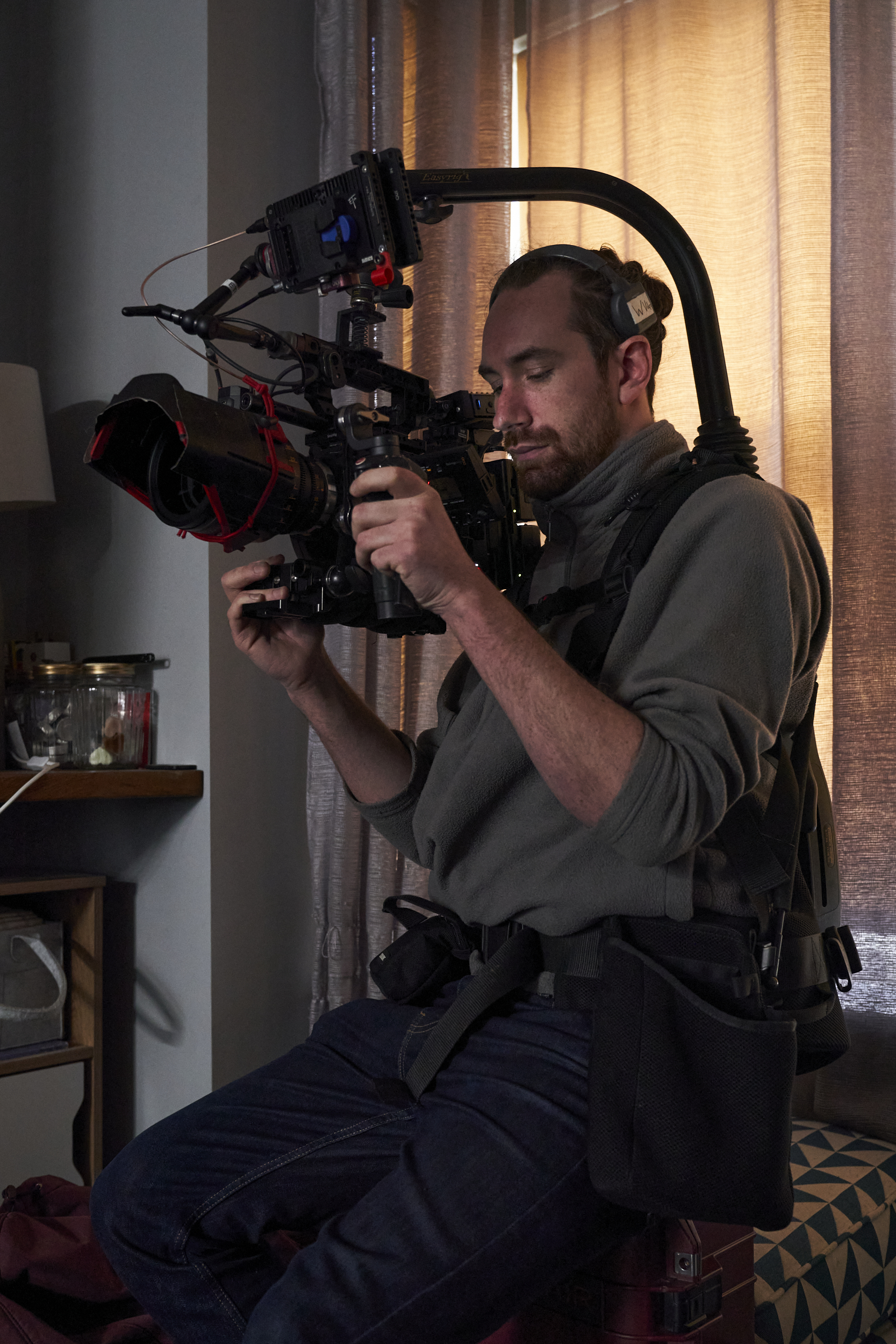
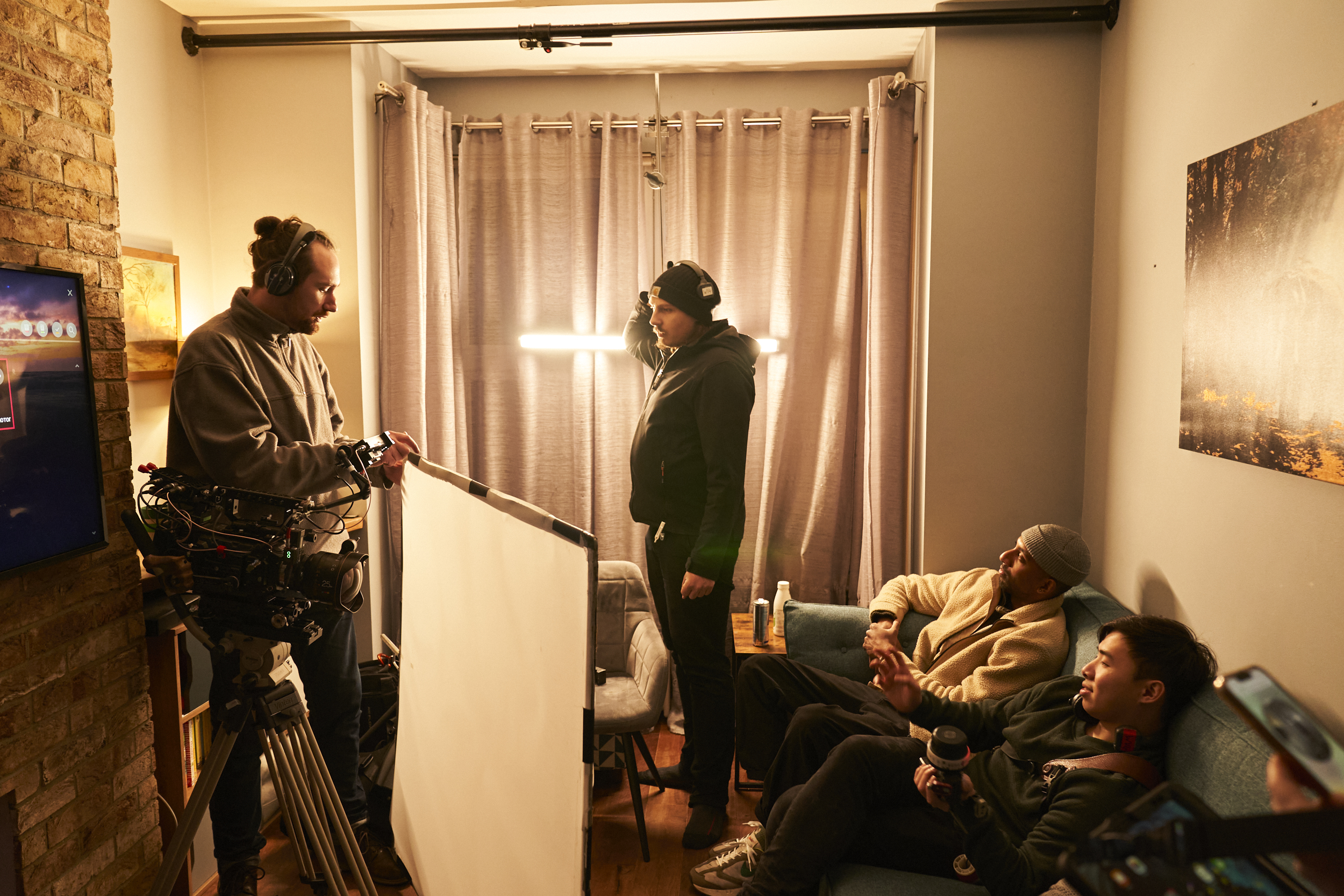
For what group of spectators is your film targeted?
Well, of course, it would seem that Slava's prime target audience would be the Ukrainian diaspora. However I do believe that the film could speak to immigrants in general (first, second, third generations,) such as myself. It explores the concept of identity and touches the broader themes of homeland and belonging via Slava's personal journey and her attempt to deal with the survival guilt and the impostor syndrome. Ijeoma Umebinyuo said it beautifully:
"So, here you are
Too foreign for home
Too foreign for here.
Never enough for both."
Why should distributors buy your film?
The film explores a very relevant topic of the current socio-political situation in our world. But it's also a timeless subject as military conflicts and wars have been part of human history and it seems they are here to stay for the upcoming decades of our future. When the war comes to your home, every war in this world becomes yours. And as long as we keep talking about it as "local conflicts", somewhere far from us, we won't start to heal as humanity. These tragic events impact us, humans, in different ways, however each experience is a unique story woven into our collective pain. The cycle of news is short, in a perpetual chase of the newest story. But art can help us to interlace the voices in an attempt to transform the collective pain into collective healing.
How would you specify your work? What characterizes your film?
Nowadays, with social media, the perception of wars has changed. It's no longer "dark cinematography" and "epic music". The horror of the war is in its mundane aspect: the shelling happens under a sunny sky, the air raids are part of people's everyday life. We can see the daily lives of the soldiers on the frontlines via TikTok...We are more involved in what's happening but at the same time we often treat it almost as a reality show. The news becomes constant noise in the background. I wanted to blur as much as possible the lines between the two realities: between the war in Ukraine and the peaceful reality of Slava, and in parallel between the fiction and the audience's reality . The TV screen and the news become progressively, at moments, the film itself, the entire film is shot with a handheld camera and the main role is played not by a professional actor but by a real life refugee.
I have chosen a brighter, bold palette for the film and 90% of the story takes place in one location (Slava's house), in an attempt to re-enforce the feeling of Slava being stuck between the two realities and the lines being blurred in her head. The only time we see Slava not wearing color (in all gray) is in the only scene taking place outside of her house.
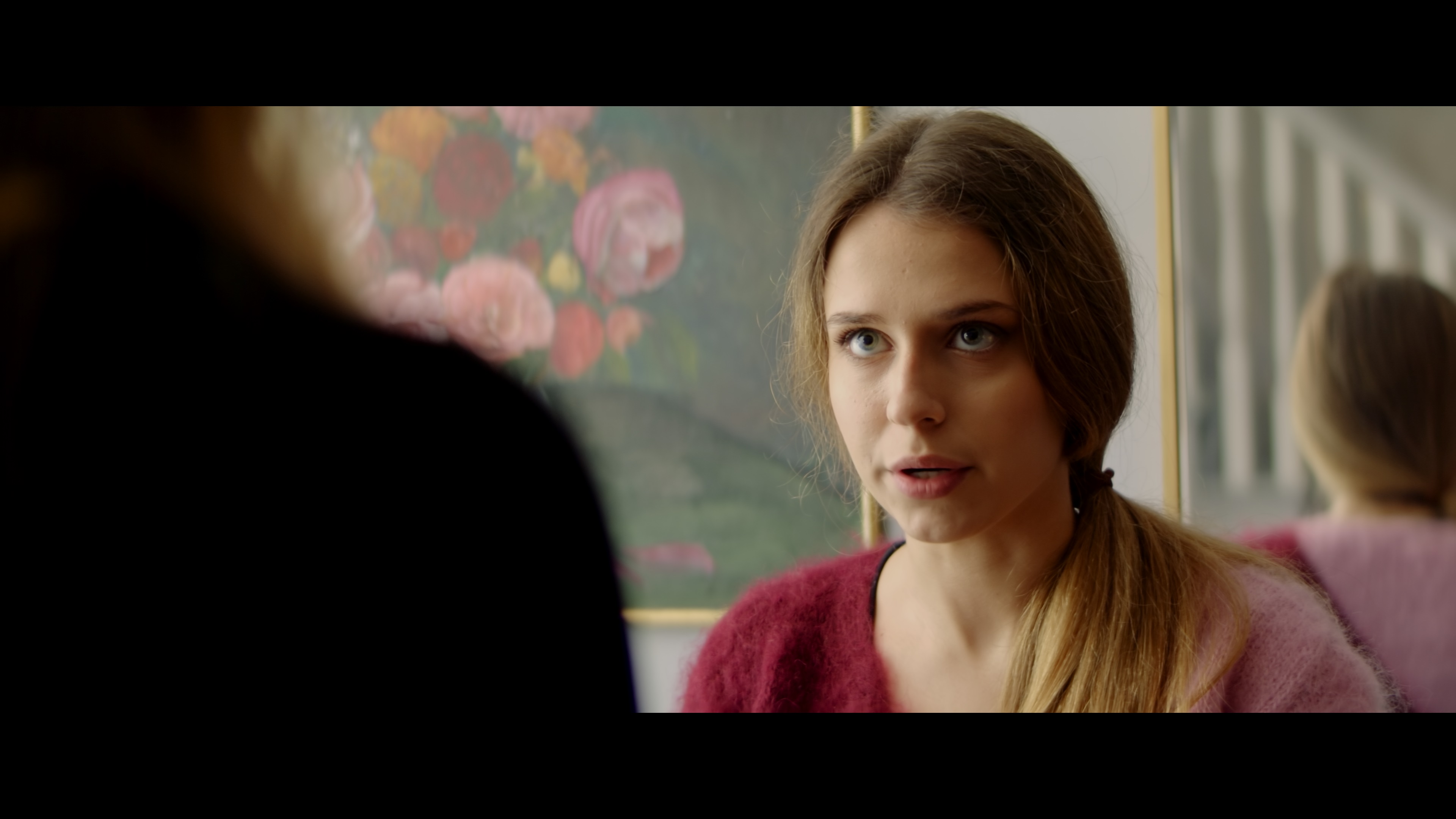
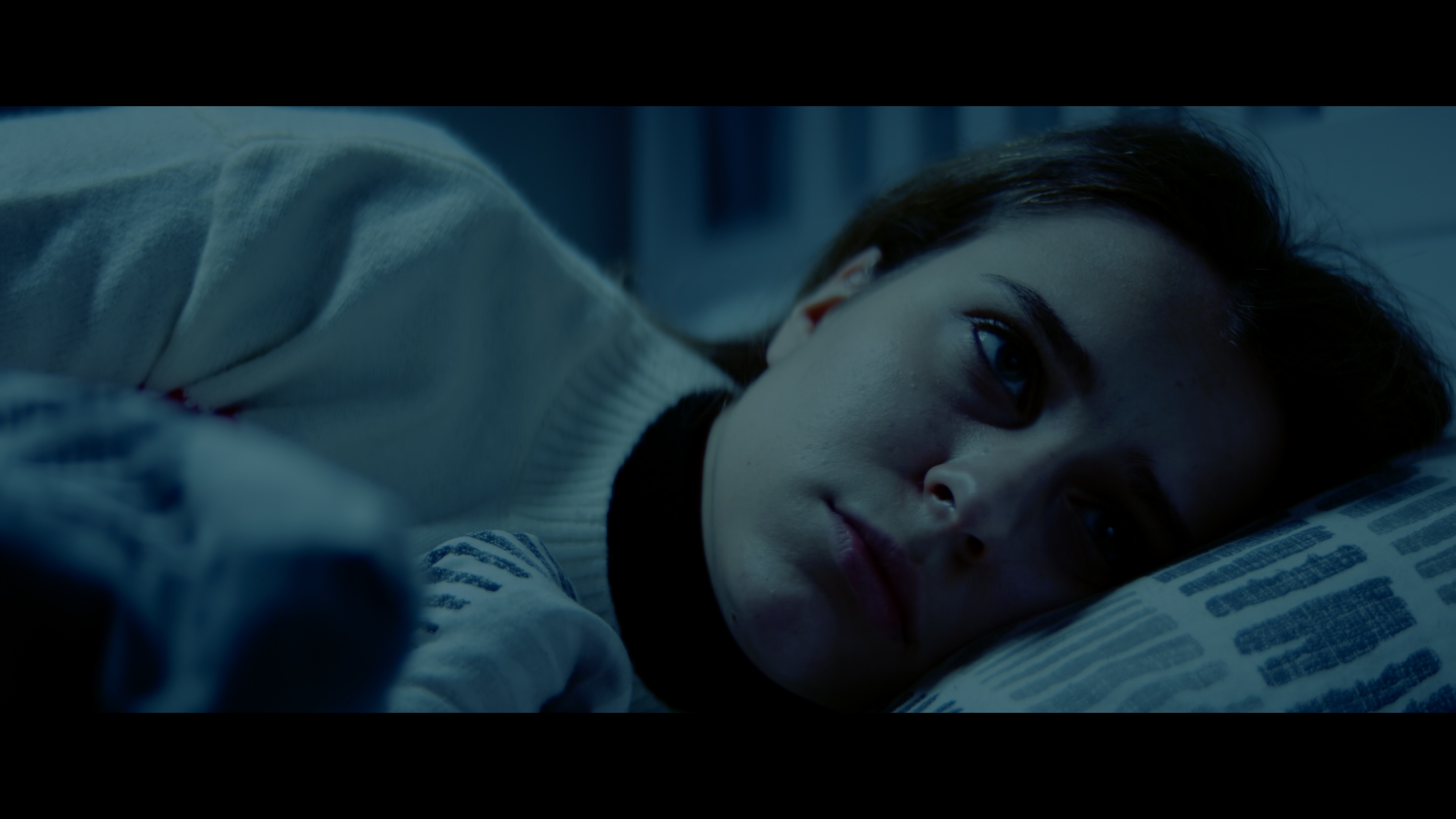
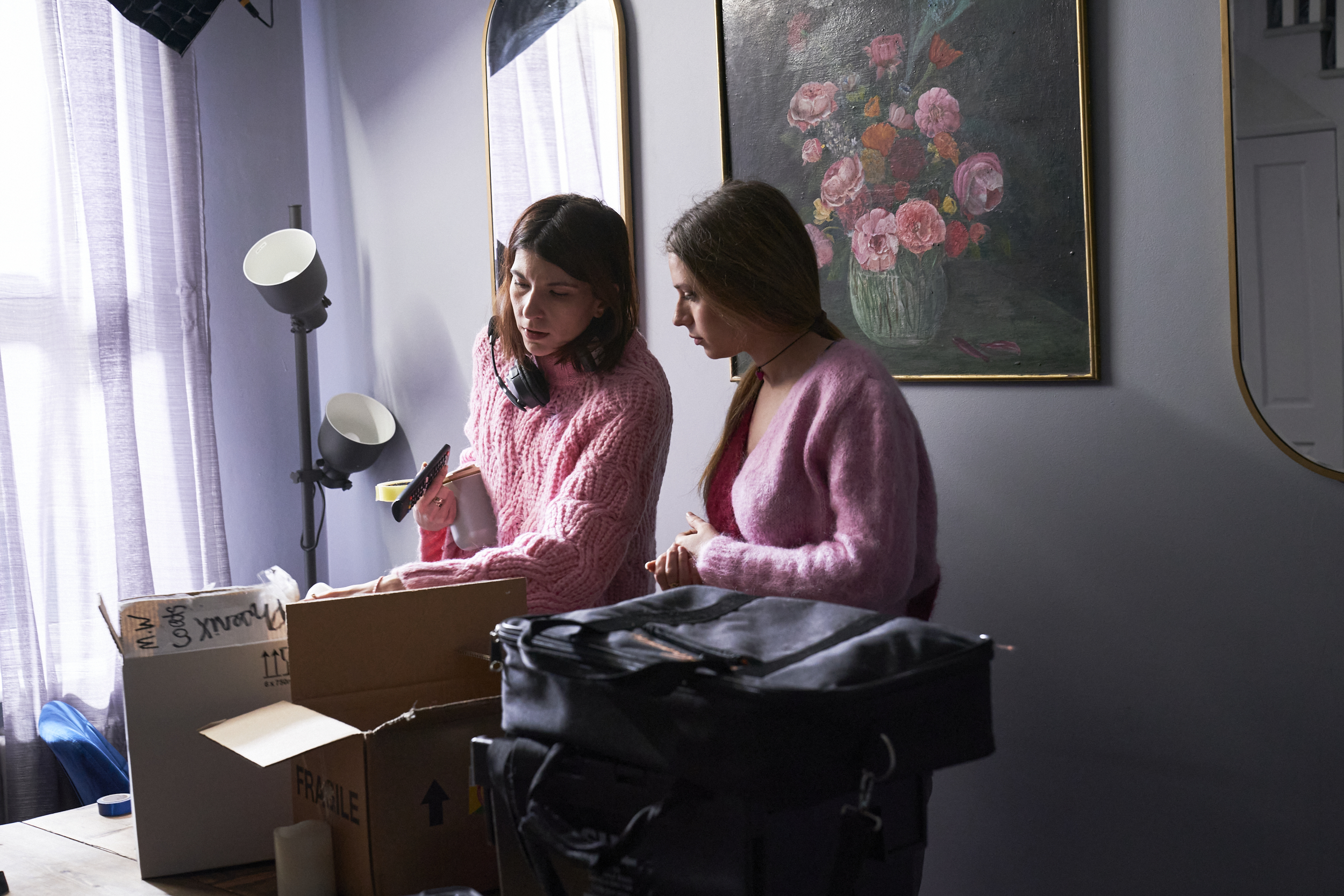
Why did you decide to become a filmmaker?
I have a theater background. My first job as a director was for a stage play. But what I found lacking for me in theater is the intimate connection between a character and the audience, which film can provide. For the topics I love to explore in my writings I find that film is the better tool to tell the story. Maybe this is the reason for my obsession with close ups and long shots.
Who is your role model?
My mum.
Which movies are your favorites? Why?
"Habla con ella" Almodovar, "Requiem for a dream" Aronofsky, "Eternal Sunshine of the Spotless Mind" Gondry, "Life Is Beautiful" Benigni, "Hiroshima, Mon Amour" Resnais and from more recent films "The Banshees of Inisherin" McDonagh.
Where do you look for inspiration for your films?
Music. Especially when I write a screenplay, I always get obsessed with a couple of songs which help me better see the scenes, their rhythm and feel the characters. I listen to the songs on repeat until the project is done, then I almost never listen to them again.
Which topics interest you the most?
Sex, death and the meaning of life. I am joking, well...partially joking.
I am intrigued by the feelings of guilt and shame (or the lack of them), and the topics that provoke those feelings. I think we can find out so much about ourselves exploring those feelings. For me guilt, shame and empathy are what really differentiate us from other species. Are those born from layers of social norms, learn morals, ego? Or a consequence of the innate human desire to be perceived as attractive and good?
What do you consider your greatest achievement in your career?
As it's my directorial debut (in film) I don't know if it can qualify as a career already. So I would say my greatest achievement probably is that I was confident enough or arrogant enough to believe I can do it and do it!
And of course, I am extremely proud and honored that "Slava", five months in its festival run, has been recognised by such cool festivals as AIMAFF, Prague International Film Awards, San Francisco Arthouse Short Festival, ONYKO Film Awards and others.
What do you consider most important about filming?
The story.
Which film technique of shooting do you consider the best?
I've mentioned my obsession with long shots and close ups. I also like when you give the audience the feel of the mise en scene, and I love the power of the tableau shots. Going back to my theater background, I've always been intrigued by the form "tableau vivant". I find there is so much power in stillness and I try to incorporate the stillness in my work. I think it shows from the editing of "Slava".
How would you rate/What is your opinion about current filmmaking?
Well it depends, are we talking about filmmaking as entertainment or filmmaking as art. Both are necessary, both exist but have different functions in society. It's nothing new, it's always been like this with every creative sphere that becomes an industry (music, theater etc). I think art can never be entertaining, it can be many things: a tool of survival, an act of service, a mirror of the society we live in, pushing people to look at themselves, see themselves, ask questions. It can't be entertaining, because art is never convenient. But we also need creative pieces of work that will provide just entertainment, an escape and pleasant pastime.
What can disappoint you in a movie?
The desire to make it artistic.
Who supports you in your film career?
My delusion and my loved ones.
What are the reactions to your film? (opinion of spectators, film critics, friends and family)
We are extremely grateful for such an amazing start of our festival run. "Slava" has been chosen as a Finalist twice and once as a Semi-Finalist. The film also received additional 3 official selections and two honorable mentions. But even more heartwarming is the audience's feedback. Hearing that it touched someone, that the story resonated with their experience and they felt heard- is truly the biggest recognition I could have wished for.
Have you already visited any of the prestigious film festivals?
Yes, I had the chance to be at the BFI London Film Festival, Sofia International Film Festival, Raindance, and Kyiv International Film Festival Molodist.
What are your future plans in a filmmaking carriere?
I've just finished writing a screenplay for a feature. But I haven't decided yet, maybe I would first adopt the screenplay for a short as a teaser before making it into a feature. Tomorrow has yet to come and for now I am grateful for the opportunity to see my first short film on the big screen.
Learn more about SLAVAWell, of course, it would seem that Slava's prime target audience would be the Ukrainian diaspora. However I do believe that the film could speak to immigrants in general (first, second, third generations,) such as myself. It explores the concept of identity and touches the broader themes of homeland and belonging via Slava's personal journey and her attempt to deal with the survival guilt and the impostor syndrome. Ijeoma Umebinyuo said it beautifully:
"So, here you are
Too foreign for home
Too foreign for here.
Never enough for both."
Why should distributors buy your film?
The film explores a very relevant topic of the current socio-political situation in our world. But it's also a timeless subject as military conflicts and wars have been part of human history and it seems they are here to stay for the upcoming decades of our future. When the war comes to your home, every war in this world becomes yours. And as long as we keep talking about it as "local conflicts", somewhere far from us, we won't start to heal as humanity. These tragic events impact us, humans, in different ways, however each experience is a unique story woven into our collective pain. The cycle of news is short, in a perpetual chase of the newest story. But art can help us to interlace the voices in an attempt to transform the collective pain into collective healing.
How would you specify your work? What characterizes your film?
Nowadays, with social media, the perception of wars has changed. It's no longer "dark cinematography" and "epic music". The horror of the war is in its mundane aspect: the shelling happens under a sunny sky, the air raids are part of people's everyday life. We can see the daily lives of the soldiers on the frontlines via TikTok...We are more involved in what's happening but at the same time we often treat it almost as a reality show. The news becomes constant noise in the background. I wanted to blur as much as possible the lines between the two realities: between the war in Ukraine and the peaceful reality of Slava, and in parallel between the fiction and the audience's reality . The TV screen and the news become progressively, at moments, the film itself, the entire film is shot with a handheld camera and the main role is played not by a professional actor but by a real life refugee.
I have chosen a brighter, bold palette for the film and 90% of the story takes place in one location (Slava's house), in an attempt to re-enforce the feeling of Slava being stuck between the two realities and the lines being blurred in her head. The only time we see Slava not wearing color (in all gray) is in the only scene taking place outside of her house.



Why did you decide to become a filmmaker?
I have a theater background. My first job as a director was for a stage play. But what I found lacking for me in theater is the intimate connection between a character and the audience, which film can provide. For the topics I love to explore in my writings I find that film is the better tool to tell the story. Maybe this is the reason for my obsession with close ups and long shots.
Who is your role model?
My mum.
Which movies are your favorites? Why?
"Habla con ella" Almodovar, "Requiem for a dream" Aronofsky, "Eternal Sunshine of the Spotless Mind" Gondry, "Life Is Beautiful" Benigni, "Hiroshima, Mon Amour" Resnais and from more recent films "The Banshees of Inisherin" McDonagh.
Where do you look for inspiration for your films?
Music. Especially when I write a screenplay, I always get obsessed with a couple of songs which help me better see the scenes, their rhythm and feel the characters. I listen to the songs on repeat until the project is done, then I almost never listen to them again.
Which topics interest you the most?
Sex, death and the meaning of life. I am joking, well...partially joking.
I am intrigued by the feelings of guilt and shame (or the lack of them), and the topics that provoke those feelings. I think we can find out so much about ourselves exploring those feelings. For me guilt, shame and empathy are what really differentiate us from other species. Are those born from layers of social norms, learn morals, ego? Or a consequence of the innate human desire to be perceived as attractive and good?
What do you consider your greatest achievement in your career?
As it's my directorial debut (in film) I don't know if it can qualify as a career already. So I would say my greatest achievement probably is that I was confident enough or arrogant enough to believe I can do it and do it!
And of course, I am extremely proud and honored that "Slava", five months in its festival run, has been recognised by such cool festivals as AIMAFF, Prague International Film Awards, San Francisco Arthouse Short Festival, ONYKO Film Awards and others.
What do you consider most important about filming?
The story.
Which film technique of shooting do you consider the best?
I've mentioned my obsession with long shots and close ups. I also like when you give the audience the feel of the mise en scene, and I love the power of the tableau shots. Going back to my theater background, I've always been intrigued by the form "tableau vivant". I find there is so much power in stillness and I try to incorporate the stillness in my work. I think it shows from the editing of "Slava".
How would you rate/What is your opinion about current filmmaking?
Well it depends, are we talking about filmmaking as entertainment or filmmaking as art. Both are necessary, both exist but have different functions in society. It's nothing new, it's always been like this with every creative sphere that becomes an industry (music, theater etc). I think art can never be entertaining, it can be many things: a tool of survival, an act of service, a mirror of the society we live in, pushing people to look at themselves, see themselves, ask questions. It can't be entertaining, because art is never convenient. But we also need creative pieces of work that will provide just entertainment, an escape and pleasant pastime.
What can disappoint you in a movie?
The desire to make it artistic.
Who supports you in your film career?
My delusion and my loved ones.
What are the reactions to your film? (opinion of spectators, film critics, friends and family)
We are extremely grateful for such an amazing start of our festival run. "Slava" has been chosen as a Finalist twice and once as a Semi-Finalist. The film also received additional 3 official selections and two honorable mentions. But even more heartwarming is the audience's feedback. Hearing that it touched someone, that the story resonated with their experience and they felt heard- is truly the biggest recognition I could have wished for.
Have you already visited any of the prestigious film festivals?
Yes, I had the chance to be at the BFI London Film Festival, Sofia International Film Festival, Raindance, and Kyiv International Film Festival Molodist.
What are your future plans in a filmmaking carriere?
I've just finished writing a screenplay for a feature. But I haven't decided yet, maybe I would first adopt the screenplay for a short as a teaser before making it into a feature. Tomorrow has yet to come and for now I am grateful for the opportunity to see my first short film on the big screen.
IMDB: https://www.imdb.com/title/tt27738490/?ref_=ttpl_ov
OFFICIAL TRAILER: https://vimeo.com/836641442?share=copy
INSTAGRAM: https://www.instagram.com/slavathefilm/?igshid=MzRlODBiNWFlZA%3D%3D
OFFICIAL TRAILER: https://vimeo.com/836641442?share=copy
INSTAGRAM: https://www.instagram.com/slavathefilm/?igshid=MzRlODBiNWFlZA%3D%3D
